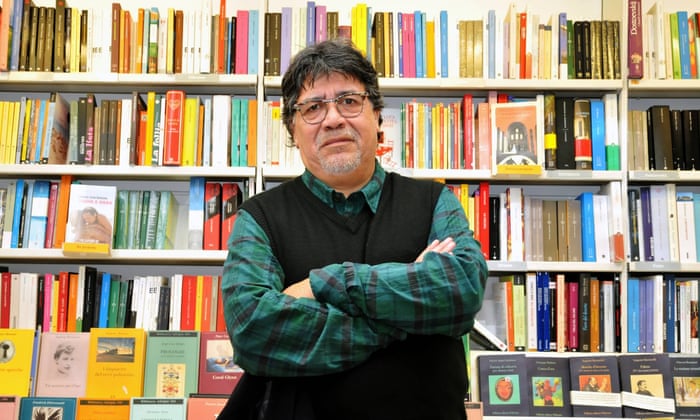 |
| Luis Sepúlveda, pictured in Italy in 2019. Photograph: Roberto Cano |
Chilean author, campaigner and escapee Luis Sepúlveda dies aged 70 of Covid-19
Thu 16 Apr 2020 17.56 BST
The celebrated Chilean author Luis Sepúlveda, who was exiled by the dictator Augusto Pinochet in the 1980s, has died from Covid-19.
Best known for his 1992 novel The Old Man Who Read Love Stories and 1996’s The Story of a Seagull and The Cat Who Taught Her To Fly, Sepúlveda died in hospital on Thursday. He first began showing symptoms from coronavirus on 25 February, after returning to his home in Spain from a festival in Portugal. On 1 March, it was confirmed that Sepúlveda was the first case of Covid-19 in the Asturias region, where he had lived for 20 years.
“Health workers gave everything to save his life but he never got over the illness. My condolences to his wife and family,” tweeted Adrián Barbón, president of the Asturias region.
Sepúlveda’s works, appreciated for their simple humour and depictions of life in South America, have been translated in some 50 countries and range from novels and screenplays to children’s stories. Sepúlveda was particularly successful in Europe, where he had been based since the 80s.
Born in 1949 in Ovalle, north of the Chilean capital Santiago, Sepúlveda was a political activist from a young age, first for the Communist Youth of Chile, and then for the Socialist party.
He was arrested and jailed for treason for two and a half years in 1973 under the military regime of Pinochet, whose dictatorship lasted 17 years, during which at least 38,000 people were tortured and 3,200 people killed or disappeared.
After intervention from Amnesty International, Sepúlveda was conditionally freed to house arrest. He then escaped and lived underground for nearly a year before being recaptured and sentenced to 28 years in prison. After more assistance from Amnesty, his sentence was changed to eight years in exile.
In 1977, while travelling to Sweden to teach Spanish literature, Sepúlveda escaped again on his stopover in Argentina and headed to Paraguay. He never returned to live in Chile and his nationality was stripped from him until 2017.
After leaving his home country he travelled around Latin America, where he founded theatre troupes in Ecuador, Peru and Colombia. In Nicaragua, he fought with the Nicaraguan Sandinistas, who went on to overthrow the dictatorship in force at the time.
In 1978, Sepúlveda spent a year living under a Unesco study programme with the indigenous Shuar people in the Amazon. They would feature in his first novel, published in 1992, The Old Man Who Read Love Stories, a rallying call to redefine man’s relationship with nature.
Translated into 35 languages, the novel was a global success and in 2001 a film version starring Richard Dreyfuss was directed by Rolf de Heer.
After 1982, Sepúlveda lived in Europe, firstly in Hamburg, where he became a journalist and sailed the seas for several years with Greenpeace. In 1996, he settled in Asturias, with his wife Carmen Yáñez, a poet who had been tortured under Pinochet.
She survives him.


No comments:
Post a Comment